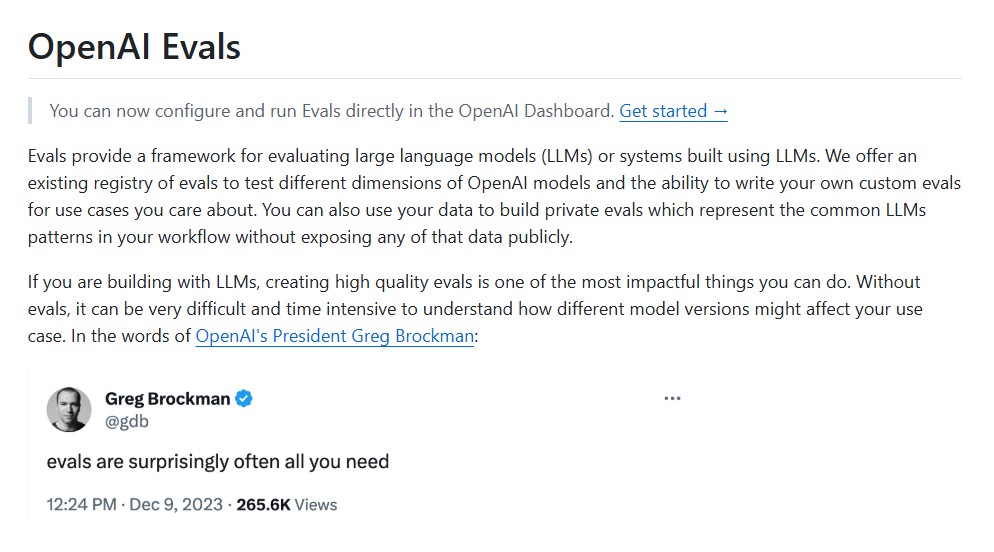As large language models (LLMs) continue to reshape industries from education and healthcare to marketing and software development – the need for reliable evaluation methods has never been greater. With new models constantly emerging, developers and researchers require a standardized system to test, compare and understand model performance across real-world scenarios. This is where OpenAI Evals, an open-source framework by OpenAI plays a transformative role.

OpenAI Evals provides a robust infrastructure for evaluating LLMs and systems built on top of them. It offers a growing registry of pre-built evaluation sets and the flexibility to create custom benchmarks for specific use cases. This tool empowers AI researchers, developers and businesses to ensure that their language models meet high standards of accuracy, reliability and fairness before deployment.
What is OpenAI Evals?
OpenAI Evals is an open-source framework designed to help users systematically assess the performance of large language models. It allows users to run, build and customize evals – structured tests that measure how well models perform on specific tasks. Whether you are comparing two versions of GPT models, testing a prompt-engineered system or evaluating model responses for accuracy and tone, OpenAI Evals makes it easier and more consistent.
The framework is integrated with the OpenAI API, meaning users can evaluate OpenAI’s models as well as their own implementations built using LLMs. Moreover, it provides support for model-graded evals where the evaluation itself is done using another model saving significant time and effort.
Key Features and Benefits
1. Comprehensive Evaluation Framework
OpenAI Evals comes with a broad registry of existing evals covering various domains such as question answering, summarization and reasoning. Developers can instantly use these templates to benchmark model performance without building everything from scratch.
2. Custom Evals for Specific Use Cases
The framework supports building custom evals, allowing users to test models on data that reflects their unique workflows. This is particularly useful for enterprises that rely on domain-specific tasks such as customer support chatbots, educational tutors or legal document analysis tools.
3. Ease of Setup and Integration
OpenAI Evals works seamlessly with the OpenAI API. Once you have your API key, you can install the framework using simple commands such as:
pip install evals
or for developers who wish to contribute:
pip install -e .
You can also integrate it with Weights & Biases (W&B) for advanced logging and visualization of results.
4. Collaborative and Open-Source
As an open-source project hosted on GitHub, OpenAI Evals encourages contributions from the global AI community. Researchers can share datasets, develop new evaluation methods and collaborate to improve the reliability of AI systems worldwide.
5. Transparent and Reproducible Results
Because all evals and results can be logged and version-controlled, OpenAI Evals promotes transparency and reproducibility in LLM evaluation. This makes it easier for teams to compare model updates, track performance over time and make data-driven decisions about model deployment.
How to Get Started with OpenAI Evals
1. Installation and Setup
To start using OpenAI Evals, ensure you have Python 3.9 or higher installed. Then, set your OpenAI API key as an environment variable:
export OPENAI_API_KEY=your_api_key
Once configured, install the package using pip or clone the GitHub repository for direct development access.
2. Downloading the Evals Registry
The repository uses Git Large File Storage (Git LFS) for dataset management. Run the following commands to download all evaluation data:
git lfs fetch --all git lfs pull
This will populate your local system with the evaluation datasets stored under evals/registry/data.
3. Running Evals
If your goal is to test an existing model without creating new evaluations, simply install and run:
python -m evals.cli.oaieval
You can specify parameters, input data and output formats to match your evaluation goals.
4. Building Custom Evals
For users who want to design custom tests, OpenAI provides detailed documentation in files like build-eval.md, custom-eval.md and completion-fns.md. These resources guide you through creating your own evaluation logic or using YAML files for model-graded evals without writing code.
Applications of OpenAI Evals
OpenAI Evals has become a powerful asset for multiple stakeholders in the AI ecosystem:
- For Developers: It helps fine-tune prompts and test new model versions for performance consistency.
- For Businesses: It enables quality assurance for AI-powered applications before integration.
- For Researchers: It provides a standardized benchmark to measure model advancements.
- For Educators: It supports the creation of AI learning projects focused on ethical and accurate model evaluation.
Why Evals Matter in the AI Ecosystem
Without proper evaluation, even the most advanced LLMs can produce unreliable or biased outputs. OpenAI Evals addresses this challenge by offering a structured, transparent, and repeatable process for testing models. It enables the AI community to make informed decisions about model upgrades, understand trade-offs between performance and cost and ensure AI systems align with ethical guidelines.
In Greg Brockman’s words, “If you are building with LLMs, creating high-quality evals is one of the most impactful things you can do.” This philosophy underlines why evaluation is not just a technical task – it is a fundamental part of building trustworthy AI systems.
Conclusion
OpenAI Evals represents a major step forward in how we understand, compare, and validate the performance of language models. Its open-source nature, flexible design, and integration with the OpenAI API make it a vital tool for anyone working with AI models today. Whether you’re a researcher developing new benchmarks, a company testing AI-driven products, or a developer optimizing prompts, OpenAI Evals empowers you to evaluate with confidence and transparency.
By using OpenAI Evals, you not only enhance your AI’s performance but also contribute to a global effort toward more reliable, fair, and responsible artificial intelligence.
Follow us for cutting-edge updates in AI & explore the world of LLMs, deep learning, NLP and AI agents with us.
Related Reads
- Skyvern: The Future of Browser Automation Powered by AI and Computer Vision
- Steel Browser: The Open-Source Browser API Powering AI Agents and Automation
- Bytebot: The Future of AI Desktop Automation
- Claude-Flow v2.7: The Next Generation of Enterprise AI Orchestration
- Nanobrowser: The Open-Source AI Web Automation Tool Changing How We Browse

2 thoughts on “OpenAI Evals: The Framework Transforming LLM Evaluation and Benchmarking”